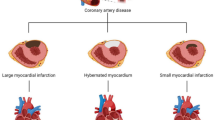Abstract
Background
The significance of ischemic ECG changes during adenosine infusion in patients with normal myocardial perfusion imaging (MPI) is controversial. We evaluated the prevalence of, and defined the predictors for, severe coronary artery disease (CAD) in patients with such discordant findings.
Methods
The findings of 3700 adenosine MPI studies performed at our institution between June 2005 and March 2009 were reviewed.
Results
Data for 76 patients who had not previously undergone coronary revascularization and who had sufficient follow-up were analyzed; 22 (29%) were referred for coronary angiography and 10 (13%) underwent revascularization. None had left main disease and only three (14%) had multivessel disease. Diabetes mellitus was more prevalent (70% vs. 23%; P = .010) and ischemic ST-segment depressions more often lasted >5 minutes (50% vs. 15%; P = 0.021) in patients undergoing revascularization. During a 24 ± 13 month follow-up period, there were no deaths or myocardial infarctions, while an eleventh patient underwent revascularization 19 months after MPI.
Conclusions
In the presence of normal MPI, the specificity of ischemic ECG changes during adenosine infusion for the detection of severe obstructive CAD is poor, although patients with multiple coronary risk factors, particularly diabetes mellitus, should undergo further investigation.

Similar content being viewed by others
References
Kamal AM, Fattah AA, Pancholy S, Aksut S, Cave V, Heo J, et al. Prognostic value of adenosine single-photon emission computed tomographic thallium imaging in medically treated patients with angiographic evidence of coronary artery disease. J Nucl Cardiol 1994;1:254-61.
Cosmai E, Heller G. The clinical importance of electrocardiographic changes during pharmacologic stress testing with radionuclide myocardial perfusion imaging. J Nucl Cardiol 2005;12:466-72.
Marshall ES, Raicheln JS, Kim SM, Intenzo CM, Sawyer DT, Brody EA, et al. Prognostic significance of ST-segment depression during adenosine perfusion imaging. Am Heart J 1995;130:58-66.
Abbott B, Afshar M, Berger A, Wackers F. Prognostic significance of ischemic electrocardiographic changes during adenosine infusion in patients with normal myocardial perfusion imaging. J Nucl Cardiol 2003;10:9-16.
Klodas E, Miller TD, Christian TF, Hodge DO, Gibbons RJ. Prognostic significance of ischemic electrocardiographic changes during vasodilator stress testing in patients with normal SPECT images. J Nucl Cardiol 2003;10:4-8.
Hage F, Dubovsky E, Jaekyeong H, Iskandrian A. Outcome of patients with adenosine-induced ST-segment depression but with normal perfusion on tomographic imaging. Am J Cardiol 2006;98:1009-11.
Hansen CL, Goldstein RA, Akinboboye OO, Berman DS, Botvinick EH, Churchwell KB, et al. ASNC imaging guidelines for nuclear cardiology imaging procedures. Myocardial perfusion and function: Single photon emission computed tomography. J Nucl Cardiol 2007;14:e39-60.
Johansen A, Høilund-Carlsen PF, Christensen HW, Vach W, Jørgensen HB, et al. Diagnostic accuracy of myocardial perfusion imaging in a study population without post-test referral bias. J Nucl Cardiol 2005;12:530-7.
Chow BJ, Wong JW, Yoshinaga K, Ruddy TD, Williams K, deKemp R, et al. Prognostic significance of dipyridamole-induced ST depression in patients with normal 82Rb PET myocardial perfusion imaging. J Nucl Med 2005;46:1095-101.
National Cholesterol Education Program (NCEP) Expert Panel on Detection, Evaluation, and Treatment of High Blood Cholesterol in Adults (Adult Treatment Panel III). Third Report of the National Cholesterol Education Program (NCEP) Expert Panel on Detection, Evaluation, and Treatment of High Blood Cholesterol in Adults (Adult Treatment Panel III) final report. Circulation 2002;106:3143-421.
Kwok Y, Kim C, Grady D, Segal M, Redberg R. Meta-analysis of exercise testing to detect coronary artery disease in women. Am J Cardiol 1999;83:660-6.
Henzlova MJ, Croft LB, Diamond JA. Effect of hormone replacement therapy on the electrocardiographic response to exercise. J Nucl Cardiol 2002;9:385-7.
Tremmel JA, Yeung AC. Ischemic heart disease in women: An appropriate time to discriminate. Rev Cardiovascul Med 2007;8:61-8.
Pries AR, Habazettl H, Ambrosio G, Hansen PR, Kaski JC, Schachinger V, et al. A review of methods for assessment of coronary microvascular disease in both clinical and experimental settings. Cardiovasc Res 2008;80:165-74.
Author information
Authors and Affiliations
Corresponding author
Rights and permissions
About this article
Cite this article
Sharma, J., Roncari, C., Giedd, K.N. et al. Patients with adenosine-induced ST-segment depressions and normal myocardial perfusion imaging: Cardiac outcomes at 24 months. J. Nucl. Cardiol. 17, 874–880 (2010). https://doi.org/10.1007/s12350-010-9259-6
Received:
Accepted:
Published:
Issue Date:
DOI: https://doi.org/10.1007/s12350-010-9259-6




